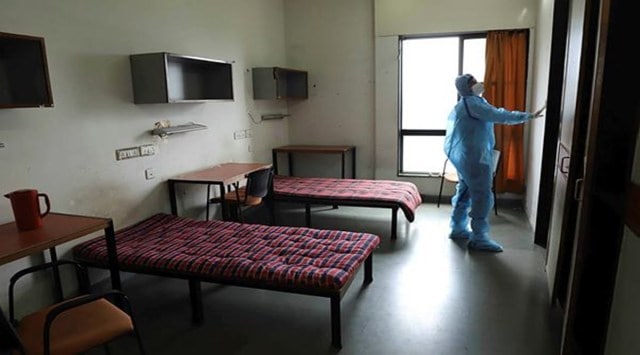- India
- International
COVID-19: Hostel bed crunch for freshers, private accommodation rent likely to go up
Hostel accommodations across campuses are anyway lesser than the number of students. With social distancing, the number of beds is expected to be lower and sanitisation, crowd management to add additional costs. Institutes are also looking at collaborating with student housing start-ups to lessen the impact
 Sanitisation process in a Engineering hostel which was converted into a COVID ward (Express Photo by Pavan Khengre)
Sanitisation process in a Engineering hostel which was converted into a COVID ward (Express Photo by Pavan Khengre)India has only one bed available per six students, according to CBRE – a global commercial real estate services and investment firm. The COVID-19 pandemic is likely to make this ratio more skewed.
While the student enrollment has been recorded at 36.64 million in 2017-18 and is still rising, the number of beds offered by universities is a little over 6.5 million hostel beds, the CBRE report said. Maintaining social distancing or reducing the number of beds would not only mean on-campus accommodations for fewer students, but will also raise concerns over maintaining affordability, which is a key factor for most hostel dwellers.
Most of the institutes, including central universities, IITs, and private colleges, are not allowing all regular degree college students back to hostels just yet. Only PhD students and those enrolled in the vocational courses are allowed to be back in hostels while the rest will follow in a phased manner. This would mean the freshers will have to attend their colleges online initially.
Some institutes are setting-up newer hostel buildings on their campuses while many others are looking at collaborating with third-party accommodation providers. StanzaLiving, one of the major student housing providers in India, claims to have seen a six times jump in month-on-month queries and pre-bookings. The accommodation provider claims that the crisis has accelerated conversations with educational institutes and driven a 10X increase in collaboration for both on-campus facility management and off-campus capacity support.

Campuses collaborating with accommodation providers is not new, however. Last year, IIT-Delhi had tied-up with OYO life to offer living space to students outside the campus due to hostel crunch. Such collaborations are expected to be more this year.
The third-party collaborators, however, are facing a revenue loss. Students and government job aspirants had left their co-housing facilities, including PGs, hostels etc in March, and not many are expected to come back for another 6-9 months. Harish Nair, Executive Director and Head – Consulting, India, CBRE South Asia said, “A lot of students will not be considering coming back to colleges over safety concerns. We can expect normalcy to return in about the next 6-9 months. But when it happens, the triple sharing bedrooms will be moved to two or even single sharing rooms. With the reduction in the number of beds within each facility, not all common places will open up. Among the facilities which will reopen, staggered entry, crowd management, sanitisation etc will incur additional costs.”
Read | School closure may cost India over $400 billion: World Bank
“The number of beds reduced will also lessen the revenue. This might make the rents go higher for premium properties but there is a huge population who is not willing to or not able to spend as much on accommodation, thus it cannot be increased as much. Operators will have to expand in order to sustain. Gradually, the unorganised sector of students in coaching industries can also be expected to gravitate to the formal co-living sector,” he added.
Students joining the housing facilities are also prepared for the change, say experts. Anindya Dutta, MD, and co-founder, Stanza Living said the pandemic has also changed consumer behaviour. “Due to the pandemic, consumers prioritise safety and hygiene, there is pressure on all rental housing and campus facility operators to ensure that their accommodation solutions and services maintain the highest hygiene and sanitation protocols. There has been a significant shift in consumer preference towards branded and professionally managed accommodation options,” he said.
He said that apart from health, self-sufficient and uninterrupted daily living ecosystems will also be a key indicator for students choosing living spaces. “The pandemic has created wariness of depending on third-party vendor support such as maids, cooks, delivery persons etc,” he said.
Sponsored | Empowering Leadership through AI Integration: Catalysing Business Transformation
Apr 26: Latest News
- 01
- 02
- 03
- 04
- 05








































